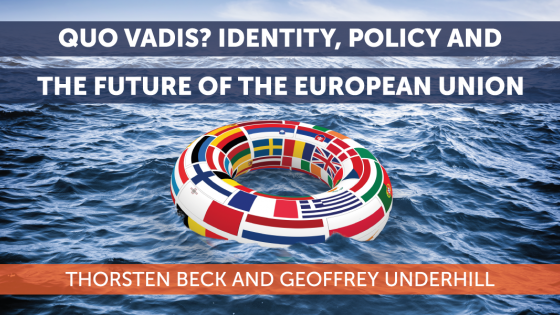Europe is clearly in a crisis – a political crisis, with the impending departure of the UK (Baldwin 2016) and anti-integration sentiment on the rise across the member states; an economic crisis, with the Eurozone only slowly (and after almost a decade) coming out of low or no growth and with many countries still enmired in recession (Scarpetta et al. 2016); a social crisis, with a large share of the youth in many countries unemployed or underemployed (Dolado 2015) and the future of the aged likewise increasingly uncertain. These analytically distinguishable dimensions of crisis are interacting dangerously and fast. This column introduces a new eBook:
Download the new eBook here:
The institutions and even very idea of the EU are under fire. Most importantly, at the national level, large parts of the population feel disenfranchised, which is driving rising support for populist parties across Europe (Buti and Pichelmann 2017). At the same time, the EU faces external threats from the East (Putin) and the West (Trump), both eager to weaken, if not destroy, European unity, including the EU. It is no exaggeration to say that Europe, as a political entity, is facing its greatest existential challenge of the past 70 years. The historical assumption that this particular crisis will, as in the past, lead to further European integration and last-minute solutions to this latest iteration of crisis should not be taken for granted. Quo vadis Europe and the European Union?
Some key findings:
- Muddling through won’t do – out-of-the-box thinking and bold moves are needed to get the EU project back on track
- A radical rethinking of the EU’s governance structure is needed, where some policy areas require more and some policy areas less centralisation
- In the absence of a European identity, reform efforts must start from the national level and national members should take greater responsibility for the decisions they take in relation to Europe
This new interdisciplinary eBook brings together 18 short essays by economists and political scientists. The focus is on their analysis of this multidimensional crisis and above all on the way out: the future of the European Union. The chapters cover a particularly wide range of policy issues and challenges, ranging from the dynamics of the EU’s ‘policy identity’, to how to deal with populism, to an eventual rebalancing, or even radical revision, of the division of powers between Brussels and the member states. The volume also deals specifically with the challenge of reform facing some of the more crucial policy domains, such as fiscal policy and the efforts at banking and financial union. Alarmingly common to all the chapters is the message that muddling through will not be enough to save the European Union as a political project. The contributors also aim explicitly to counter the charge from some quarters that the insights promoted by economists and scholars of the social sciences might be a central part of the problem. These 18 essays offer solutions, some of them bold. Our premise was that what is needed is fresh, out-of-the-box thinking.
The volume is divided into five sections:
European identity: The gap between elite perceptions of Europe and that of the majority
There seems a clear lack of European identity and there is a growing gap between how the socioeconomic and political elites and how the vast majority of the population see Europe. This goes hand in hand with not only integration fatigue but outright anti-Brussels political parties and movements. One problem, as pointed out by Maurizio Ferrera, is the lack of solidarity characterised by “econocracy” and austerity politics after the recent crises. Several contributors point to a bottom-up solution to rebuilding enthusiasm for the European project, starting from sovereign nation states, while at the same time reinforcing the principle of solidarity.
The rise of populist parties
The second section discusses the rise of populism across Europe, of which the Brexit vote was only one symptom. While the Brexit vote can be partly explained by high immigration from Central and Eastern Europe into the UK, the powerlessness and alienation felt and expressed by Brexit voters was focussed on the wrong target, i.e., on Brussels rather than Westminster, as Diane Coyle and Rob Ford argue. And while left- and right-wing populists might look alike, there are important differences. How to address the rise of populism? Not by accommodating or opposing the host ideology of contrasting populisms, but rather by developing mainstream proxies for their anti-establishment flourish and addressing more carefully voter psychology beyond purely technocratic solutions.
EU governance is stuck in a half-way house, neither fish nor fowl
Section three focuses on the structure of EU governance. On the one hand, there is a clear choice for the EU: either serve as a ‘port in the storm’ for anxious electorates, sheltering them from macroeconomic instability and the negative consequences of globalisation; or failing that, it should cease preventing national governments from playing that necessary role. On the other hand, serious governance reforms require Treaty changes, which would inevitably trigger referenda in several member countries, where pro-EU parties are unlikely to win against the populist parties, as noted by Andrew Gamble. However, part of the problem is that Brussels is too often being made the scapegoat for unpopular national decisions, so that there is also a need for a change in the narrative on both European and national level. And throughout all the current problems, one should not forget the important role that the European Union plays as a beacon of institutional reform for countries further East, as Erik Berglof points out.
Fiscal and financial sector reforms are critical to the survival of the EU
The fourth part focuses on specific policy areas reform in the EU. One important lesson from the transition economies, as pointed out by Sergei Guriev, is that losers from the long list of necessary reforms have to be compensated. Charles Wyplosz discusses one important policy area - fiscal policy – and argues that there should be a rethinking of what areas should be centralised and what areas should be decentralised. More specifically, there might be the need for a Euro area–level fiscal agency of macroeconomic significance, combined with more market discipline and less micro-management of national fiscal policies. Another area where more centralisation is needed is that of the banking union, at least for the Eurozone.
Social scientists have an important role to play in the debate
A final column looks at the role of social scientists in the new world order. Given the enormous challenges and policy choices, economists and political scientists alike have an important role to play. Equally important, however, is moving beyond technocratic analysis and policy advice to provide robust support both for the institutions that supply social scientists with the data and statistics crucial to good policy, and for an open and informed media in defence of a civilised and fact-based discourse that often proves counter-intuitive to the citizens of Europe.
References:
Baldwin, R (2016), Brexit Beckons: Thinking ahead by leading economists, Vox eBook, VoxEU.org
Buti, M and K Pichelmann (2017), "European integration and populism: Addressing Dahrendorf's quandary", VoxEU.org
Dolado, J (2015), No Country for Young People? Youth Labour Market Problems in Europe, Vox eBook, VoxEU.org
Scarpetta, S, M Keese and P Swaim ( 2016), Back in work, still out of pocket: Labour market recovery since the Great Recession, VoxEU.org



